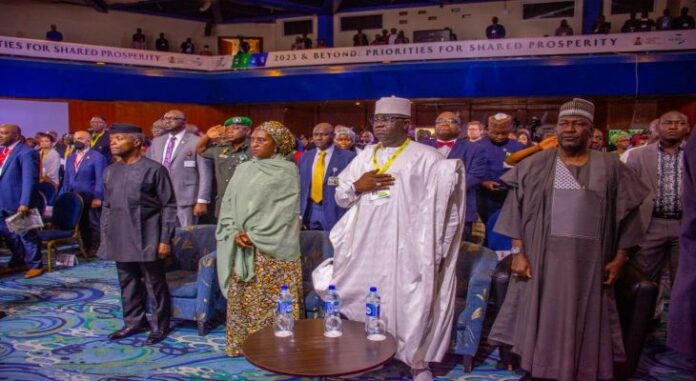
The Vice-president of the Federal Republic of Nigeria, Professor Yemi Osinbajo, has lauded the organizers of the National Economic Summit (NES) for their tenacity in ensuring the consistency of the Summit over the years, as well as always maintaining the depth and breadth of interactions with remarkable objectivity and high-level responsibility.
Osinbajo gave this commendation while declaring open the 28th edition of the summit, on Monday in Abuja.
He noted that the theme of the summit “2023 and Beyond: Priorities for Shared Prosperity” was timely in the sense that it gave the opportunity for the country to reflect on what “our priorities should be to attain inclusive prosperity from 2023 and beyond”.
The Vice-president, who spoke on behalf of President Muhammadu Buhari, highlighted some of the priorities as to include improving macroeconomic conditions to maintain growth in the GDP; finding a transparent mechanism for increasing supply and moderating demand in the exchange rate regime; securing the resources needed for investments in natural gas as well as renewable forms of energy; unlocking the potential of carbon markets, especially in Africa, leveraging the disrupting technologies offered by digitization, the need for more intentional and focused investment on youths as well as also improving social safety programmes, among others.
In her opening statement, the Honorable Minister of Finance, Budget and National Planning Dr Zainab Shamsuna Ahmed, disclosed that the theme for this year’s summit was carefully chosen to provide direction for stakeholders to examine the progress made so far during the present administration, in terms of achievement of the polices, programmes and projects encapsulated in the National Development Plan (NDP), 2021-2025.
“Over the next two days, we will have an opportunity to examine how far we have gone in implementing the strategies we have set out for sustainable economic growth and development as well as set priorities for shared prosperity beyond 2023.
“The discussion will be dimensioned along four sub-themes, namely: Delivering Macroeconomic Stability for Shared Prosperity; Investing in the Nigeria Future; Unlocking the Binding Constraints to Execution; and Reframing the Agenda for Transformational Leadership”, she explained
Ahmed said that during the implementation of the NDP 2021-2025, the financing from government would depend heavily on domestic resource mobilization from non-oil revenue sources through the results of the implementation of the Strategic Revenue Growth Initiative (SRGI) and the Annual Finance Acts, so as to improve and further diversify government revenues and entrench fiscal prudence and value for money.
She emphasized, among many, some of the achievements of the current administration which included: transformational investments in infrastructure to restore the national railways and road networks, completed projects to be complemented by ongoing investments in Light Rail, Narrow- and Standard-Gauge Rail, Airport Terminals that had been completed at Lagos, Abuja, Kano and Port Harcourt, and presently the Abuja Airport Runway being reconstructed etc.
“Other investments in airports include the safety facilities and aeronautical meteorological service delivery. Work is also ongoing in the development of seaports and ancillary infrastructure,” she further stated
She said the ongoing efforts to ensure efficiency in the power sector led to the partnership with the German government under the Presidential Power Initiative (PPI), government intervention in four distressed electricity distribution companies and the constitution of the Board of the Nigeria Electricity Liability Management Company.
According to her, efforts were also being made under the Energy Transition Plan to move from reliance on oil derivatives to gas as a transitional fuel, as renewable sources such as solar and hydro were being increased in the energy mix.
The Minister reiterated the focus of the government in unlocking the economic potential of the non-oil and high employment generating sectors to achieve sustainable, inclusive growth and development; “reforms in Agriculture are yielding results, leading to an improvement in net earnings of rural farmers to the sum of N174 billion in the areas of cassava, rice, sorghum, maize and cotton production.”
In his remarks, Minister of State, Budget and National Planning, Prince Clem Ikanade Agba, disclosed that nearly three decades of partnership between the Public and Private sectors had provided a veritable platform for dialogue on reforming the Nigerian economy, as well as, frame deliberations within the context of aspirations for a better quality of life for the citizenry.
He stated that targeted efforts by the public and private sector in building a resilient, virile and competitive economy made the Federal Government develop the Economic and Recovery Growth Plan (ERGP) 2017-2020 to restore growth, invest in the people and build a globally-competitive economy.
He said: ’principally, the conscientious implementation of the plan helped in making Nigeria exit recession early.
‘’Our vision and determination to change the development trajectory of our dear country has not waned. As we keep aspiring to attain the desired objective for Nigeria’s development, we built on gains of the ERGP and successfully delivered the National Development Plan, 2021-2022.”
Agba pointed out that the plan was to make Nigeria a country that unlocked its potential in all sectors of the economy for sustainable, holistic and inclusive development, adding that the plan was designed to lift 35 million people out of poverty and generate 21 million full-time jobs by 2025, thus setting the stage for achieving government targets of lifting 100 Nigerians out of poverty in 10 years.
The Minister explained that the plan was underpinned by a very strong macroeconomic framework, projecting annual average real GDP growth of 5 per cent and envisaged that it would come from Agriculture, Trade, Services, Construction, manufacturing, and the communication sector
He added that to achieve the growth, the plan would emphasize on improving the country’s products space and complexity.
“As the economy continues to recover from external and internal shocks, Nigeria’s prospective plan (Nigeria Agenda 2050) is designed to transform the county into an upper –middle income country by the years 2050 within the framework of six 5-year medium Term Development Plan each comprising the National Development Plan, 2021-2025, 2026-2030, 2031-2035, 2036-2040, 2041-2045 and 2046-2050,” he stated.
Agba noted that the programmes in the plans were expected to vigorously spur development and poverty reduction through institutional structures and ensure that the enabling environment needed for the private sector to play its leading role was created and galvanized.
He declared that “the theme of this year’s Twenty–Eight Nigerian Economic Summit (NES#28) ‘Shared Prosperity: 2023 and beyond: priorities for shared prosperity’’, is on time and advised the private sector to leverage the opportunities of the various sectors as Government unlocks the economy for growth and development”.
Speaking earlier, the Chairman of Economic Summit Group, Mr Asue Ighodalo, said that “in this summit, we must work harder than ever before, think differently and then we must agree on creative and practical recommendations which if implemented, will initiate our nation’s revival and pull us out of these difficulties.”
He disclosed that the theme of the summit “Shared Prosperity: 2023 and Beyond” was an aptly worded and succinct summation of the challenge before Nigeria.
Read him: “To realize the goal of prosperity, we must succeed in transforming the Nigerian economy into the complete opposite of what it is today, i.e. from hardship to true prosperity, within a specified time frame.
“The Nigeria Agenda 2050, currently being drafted, proposes a time frame of about 25 years. It means there can be no further regression, we can no longer accept just marginal improvement, or even what some may deem a decent improvement.
“We must improve at the speed of a maglev train. We must recalibrate our visioning and specifically state that we are working towards a specified target growth, by a specified date, benchmarking ourselves with the most prosperous countries in the world.
“I propose that, our specified target must be; ‘turning Nigeria into the most prosperous black country in the world, with a GDP per capita that is at par with the OECD countries, by 2050”.
‘’Our Economic Competitiveness is weak. Simply put; we don’t produce enough, for ourselves and can’t produce for the world. We must, take active steps to multiply our productive output particularly in those areas that support foreign exchange earnings and enhance livelihoods – oil and gas (gas particularly), agriculture and its manufactured derivatives easily come to mind. We must effectively address all areas of waste, leakage, theft or graft. Gas flaring, must stop. Only a nation that does not take itself seriously will cry out year after year for power, but continue to fritter away a resource that can deliver that power.
‘’We must address our infrastructure deficit, starting first with infrastructure investments that directly power economic activity, like overhauling our deep seaports, which are gateways to trade, or building fully gas-powered special economic zones, whose return on investment is both linear and tangible. It is not rocket science, but we must put in place policies and incentives that attract patient capital into our economy, supported by coordinated and consistent macroeconomics policies that grow emerging economies.




